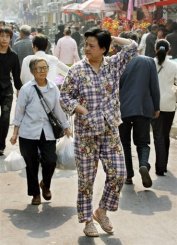When I was in the US for Thanksgiving, I couldn’t help but notice that the news was all economic crisis all the time. There was only a short window of “relief,” when the news out of Mumbai overshadowed America’s – and the world’s – financial implosion.
It isn’t much different over here in Beijing. Talking with the teachers at my school and my Chinese colleagues in the office, nearly all of whom are in their mid-to-late 20s, I was impressed by their awareness of just how serious this crisis is and how it affects their own hopes and dreams. There are no illusions, which I see as a good thing. No false expectations that things will soon return to normal.
I see this pragmatism as a good thing. The government is not showering the public in sugar-coated messages, promising that things will soon be shiny and happy once more (though I’m sure we could find some examples of that). Instead, things seem remarkably sober, at least here in Beijing.
People always refer to Chinese stoicism, and we’re seeing it now. Students graduating from college know that finding the job they may once have assumed would be waiting for them will be an exercise in frustration and repeated disappointment. Several friends of mine say they are looking for new jobs, not because they necessarily want to leave their current ones, but because they fear the axe might fall at any moment. On the other hand, those who are unhappy with their current jobs realize now isn’t the time to resign, at least not until the ink has dried on the contract for their next job.
Which brings me to the link of the day, to a story on Slumping Economy, a message board set up by unemployed Chinese white collar workers in Shanghai, which has been drawing a huge audience. The piece underscores my own observations that the Chinese are taking the crisis in stride, and that they understand its implications for their own lives.
Maria Yin, a 24-year-old recent college graduate, started searching for jobs in Shanghai this past summer, but has had no luck yet. “It seems that lots of people are facing the same problem as I do now. It makes me feel less desperate,” said Ms. Yin, who posts on Slumping Economy. “I’ll keep going.” She said she spends an hour or so surfing the site daily, chatting with her new friends and keeping an eye out for job information.
One popular thread has members thinking of cheap ways to celebrate the coming Christmas, which has been adopted by young people and residents as an opportunity to spend time together or to share romance. Some suggested holding an online Christmas party with virtual food and gifts provided, while others said they would figure out their own ways to spend the holiday in the real world.
“I’ll put on my best cotton-padded jacket and trousers and go downtown together with my boyfriend to the most beautifully decorated square. We’ll take a photo together using my mobile phone, and then spend three yuan each to take bus No. 925 home,” wrote one user, known as Chloe.
It’s a sad, tense, confusing time for everyone. I saw it in America and I’m seeing it here. I’m glad at least that in China people are psychologically prepared for the worst. I had a sense, totally unscientific, that people in America were less well prepared, if only because crisis and deprivation have been so distant from them for so many years, even for generations. American s appear far more shell-shocked than the Chinese.

Comments